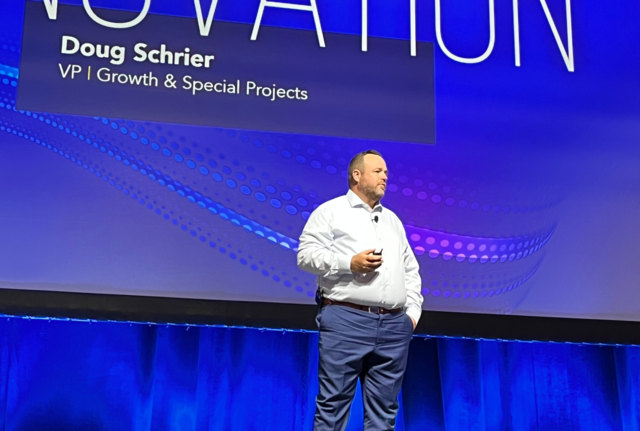“The future belongs to the those that are prepared,” Tom McLeod, founder and CEO of McLeod Software, said to attendees at the opening session of the company’s user conference this week at Charlotte, North Carolina.
As the industry feels the impact of a weak environment, McLeod suggests to, “invest in your company; invest in the future.” He highlighted how new software capabilities and leveraging artificial intelligence can help the industry improve efficiency and business operations.
While McLeod said that the overall economy is “flat, not down,” he pointed out that the trucking industry’s rate recession has dragged on for two and a half years.
The normal pattern seen in the trucking cycle is, McLeod explained, “When rates go up, companies buy extra trucks, more people come into the industry, and we end up with too many trucks, and rates go to the floor. Then trucks exit the market, rate raises up a little bit, then boom, we don’t have quite enough trucks. Rates go through the roof, and the cycle repeats."
Normally, it takes about a year to “shake out,” McLeod said, pointing out that 2018 was a great year, enabling companies to buy more trucks and hire more drivers.
Freight movement went up 2% in 2018-2019, said McLeod, "but the capacity – the number of trucks on the road, right in the middle of a driver shortage – exceeded the amount of freight that was available. That’s what makes rates go down."
Simultaneously, companies have also faced higher operational costs, driver pay, truck prices and insurance costs. Private fleets have also grown, McLeod said. “The amount of freight they’re holding is up 75%."
While companies have been under strain, McLeod said they’ve seen about 35% to 45% of trucking companies continue to do “pretty well,” and are not “overly dependent on the spot market.”
To “win the in the marketplace,” McLeod suggested improving company processes and serving customers better than competitors by investing in areas such as data science and AI, and customer service.
New AI capabilities
Doug Schrier, vice president of growth and special projects at McLeod Software, stated the company anticipates a growing integration of data science and AI in the back-office operations of trucking companies. To cater to these needs, McLeod Software introduced its first proprietary AI solution, MPact.Respond_AI, designed to easily integrate with email and telematics systems to accelerate response times to key stakeholders.
 Doug Schrier, vice president of growth and special projects at McLeod Software. Pamella De Leon/CCJ
Doug Schrier, vice president of growth and special projects at McLeod Software. Pamella De Leon/CCJ
“We want your people focused on complex issues and improving the response time by making it simpler for them to respond,” said Schrier, who showcased the AI tool’s ability to handle routine inquiries with generated responses, such as shipping status or weather updates. The tool offers templates to create common responses, which can be edited before being sent out too.
Schrier told CCJ that the company believes incremental changes and improvements, such as AI generated responses, can make an impact in the freight industry. Seeing how customers struggle with the high frequency of messages and data from emails and telematics systems, Schrier said McLeod saw a normal response time to free form a message was over 30 minutes.
“That delay means lost revenue for them, and a lot of those requests are routine and common and things that we can accelerate pretty quickly,” Schrier added.
McLeod Software also introduced the pilot release of the next generation LoadMaster tool, which includes electronic proof of delivery to allow users to capture digital signatures upon delivery and eliminate manual processes. Accessible via web-based user interface, its full launch is in early 2025.
The company released an update on PowerBroker//web, which has seen adoption increase and positive feedback.
McLeod noted that the company is aiming to offer real practical applications of AI technology with a two-pronged approach. “One is we’re doing a tremendous amount of internal development to get it tightly integrated into our products. We’re also integrating with a number of suppliers and integration partners to implement their solutions so that you’ve got the widest choice and widest availability of solutions in AI.”
Additionally, the company introduced its vendor partner marketplace, the Innovation Hub, for vendor partners and customers to create integrations suited to their needs.












